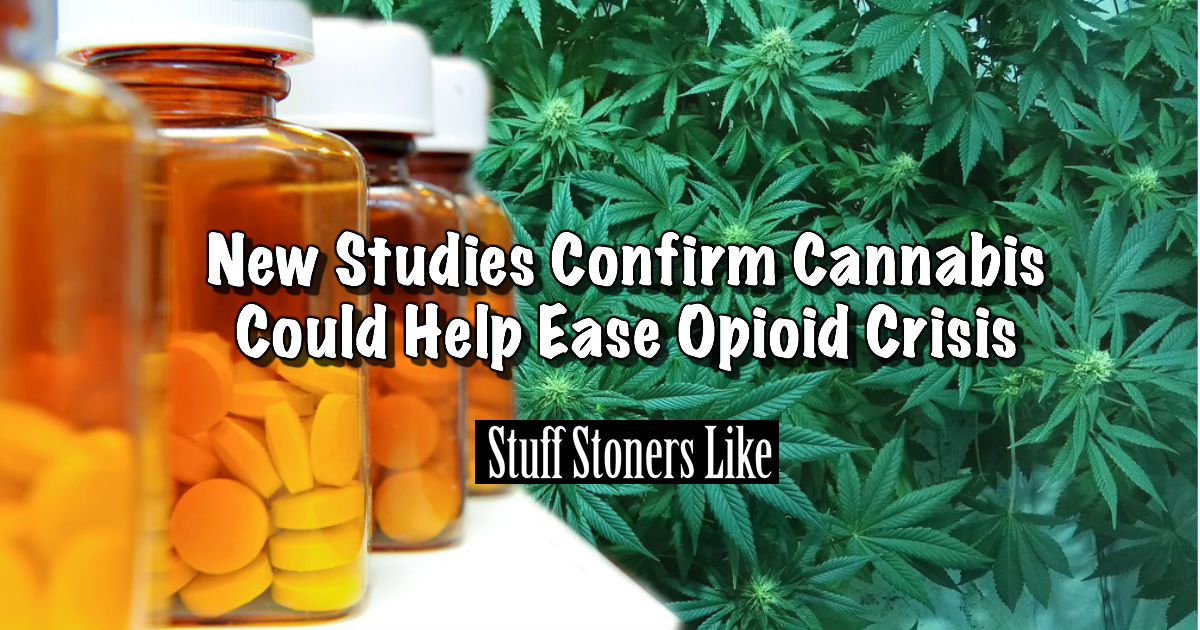 Two more studies prove cannabis is the pathway to combating the opioid epidemic—the leading cause of accidental death in Canada and the US. One study comes from Philippe Lucas, graduate researcher with the Center for Addictions Research of British Columbia. Lucas recently published, “Rationale for cannabis-based interventions in the opioid overdose crisis” in the Harm Reduction Journal. The study from Canada concludes that substituting cannabis for opioids is an effective therapy to help those addicted and those primed for addiction.
Two more studies prove cannabis is the pathway to combating the opioid epidemic—the leading cause of accidental death in Canada and the US. One study comes from Philippe Lucas, graduate researcher with the Center for Addictions Research of British Columbia. Lucas recently published, “Rationale for cannabis-based interventions in the opioid overdose crisis” in the Harm Reduction Journal. The study from Canada concludes that substituting cannabis for opioids is an effective therapy to help those addicted and those primed for addiction.
Curbing addiction with cannabis
Lucas outlines a three thronged approach to curbing the opioid epidemic. First introduce cannabis not opioids to treat chronic pain. Next use cannabis as an opioid reduction strategy for those patients already using opioids. Then use cannabis as an additional therapy to methadone or suboxone treatment in order to increase treatment success rates. He keeps his strategy simple when describing the ways to ending the opioid epidemic. First lesson—doctors shouldn’t prescribe opioids. Research suggests that 4 out of 5 heroin users report their opioid use began with a prescription.
“The argument in favor of recognizing medical cannabis as a first line option in the treatment of chronic pain is informed by science, common sense, and simple compassion: if patients never start using opioids, there is no risk their use might progress to dependence or overdose, ” he says.
Currently the medical community is limited. Doctors can’t prescribe cannabis—in some areas the can recommend it. Lucas calls out both the US and Canadian government for helping stoke the opioid epidemic. It has become apparent that Canadian clinical guidelines and the US’s national prohibitionist policies are no longer reflective of the most current evidence and best available science on cannabis, opioids, and the treatment of chronic pain, and may in fact be inadvertently contributing to the growing rate of opioid use disorder, he has said.
He’s also written about the second most effective way to help combat opioid disorder—slowly introduce cannabis into the patient’s care plan while reducing the dosage and frequency of prescription opioid use.
He cites several studies proving cannabis augments the pain relieving potential of opioids. It can also re-potentiate their effectsreducing the need to increase the dosage of opioid pain medications. “As noted earlier, cross-sectional and population-level research has shown that introducing cannabis into the treatment of chronic pain may result in a reduction or complete cessation of opioid use thereby significantly reducing the potential for dependence or overdose,” he writes.
The third cog in this wheel of intervention is using cannabis in addition to methadone or suboxone treatment to increase treatment success rates. This should allow people access to pain medication to ease withdrawal and help avoid relapse.
“Since there is an exceedingly high risk of relapse and overdose in this dependent population, particularly with introduction of fentanyl and other powerful opioids into the illicit drug market – systematic research-based strategies to explore the potential of medical cannabis to improve ORT success rates should be implemented immediately,” Lucas reports.
CBD inhibits opioid reward
The second powerful study proving the usefulness of cannabis to combat opioid abuse comes from Planta Medica, a research team at the University of Mississippi. The researchers set out to establish a link between CBD use and decreased opioid reward in the brain.
The team gave doses of morphine to mice who were also administered doses of CBD. The control group that used and recived saline alongside the morphine instead of CBD. The researchers found that the mice who had been administered CBD demonstrated a reduced need for an opioid reward. Currently a trial is underway using humans.
As 91 people die in the US each day from an opioid related overdose how long will it take government officials—especially the one leading the charge, Governor Chris Christie—to realize that marijuana can help ease the opioid crisis?
Leave a Reply
One Response to “New Studies Confirm Cannabis Could Help Ease Opioid Crisis”
timothy hanson
but as someone who has been on both sides of the addiction coin with Opiates, and now
counsel’s and still see my Councillor,now with 10+ years Sober .. and i agree pretty much all Mr. Lucas say’s after my personnel study’s and experiences, BUT my very first drug was Weed back when 14, so it has the ability to be a gateway and need’s to be fully stressed and taught. i am however SO happy they are finally taking a scientific look at Cannabis.. i been saying it for 20 years… it only took Hundreds of thousands of middle-class suburban kids to die from Dope O.D.’s to get it done, SADLY …